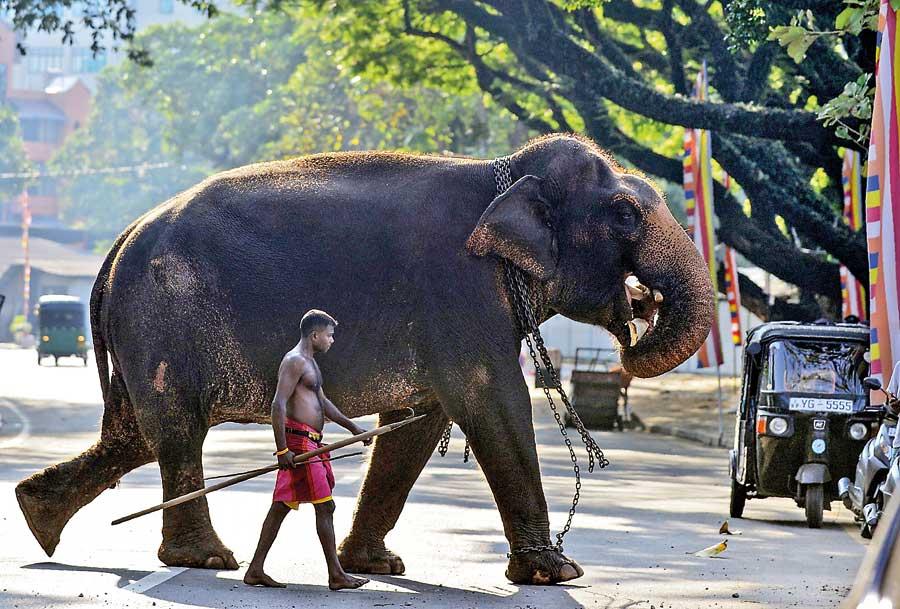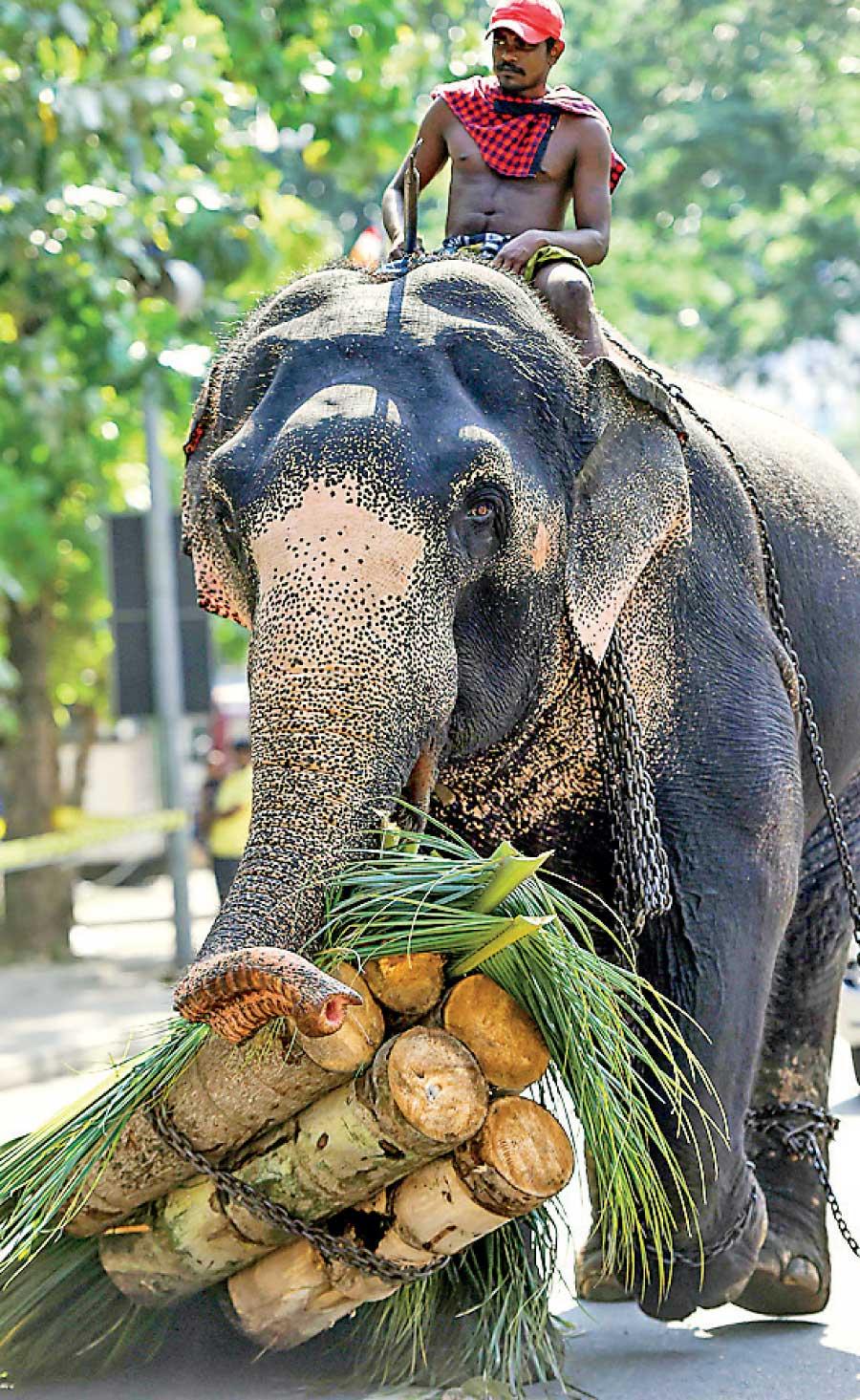Reply To:
Name - Reply Comment

There had been about 200 domesticated elephants before Sri Lanka passed a legislation banning the captivity of jumbos (AFP)
 Sri Lanka, which came under the spotlight for its human atrocities during the civil war, is now accused of being cruel to elephants. Opposition to how Sri Lanka treats domesticated elephants was aired in British Parliament by MP Dr. Rupa Hue recently. The MP wants the British Government to take steps to discourage his countrymen from visiting Sri Lanka.
Sri Lanka, which came under the spotlight for its human atrocities during the civil war, is now accused of being cruel to elephants. Opposition to how Sri Lanka treats domesticated elephants was aired in British Parliament by MP Dr. Rupa Hue recently. The MP wants the British Government to take steps to discourage his countrymen from visiting Sri Lanka.
There is a famous saying ‘There is no smoke without fire’. Sri Lanka does have a problem with elephants and the situation has now developed into a conflict between man an beast. But here the initiation for the complaint has come from NGOs.
Foreign tourists in the past have first gone to the Pinnawala Orphanage and seen animals in chains and also how poorly they are fed. Then a visit to the Yala National Park on safari gives these tourists the opportunity to witness how majestically these beasts roam in the jungles. The British, who come from a nation which supports very high animal welfare standards, are naturally irked when they see the big beasts in chains parading the streets in Sri Lanka.
The British, who come from a nation which supports very high animal welfare standards, are naturally irked when they see the big beasts in chains parading the streets in Sri Lanka
The constant reports of elephants hit by vehicles and speeding trains have contributed to the opinion of foreign tourists to go against us. Last year Ven. Wimalarathana Thera of the Bellanwila Raja Maha Viharaya dying due to an accident, which featured an elephant put the issue of whether Sri Lankans should domesticate elephants under the spotlight.
Sri Lanka attracts a fare number of British tourists each year. But with Dr. Hue’s efforts to expose Sri Lanka’s atrocities towards elephants, we might see a drop in the number of tourists arrivals from Great Britain. It’s reported that British Parliament’s David Rutley has said that the UK Government is working with the Association of British Travel Agents to make the English tourists be aware of how elephants are treated in Sri Lanka.
However, critics point out that foreign tourists need to understand that Sri Lankans maintain forest habitats like sanctuaries for elephants apart from caring for them in the backyards of their homes and temples. Sri Lanka’s history shows that there are families which have had at least one elephant during the past 100 years and that the island boasts of a well-established culture of domesticated wild elephants.
Once a Sri Lankan writer summed up the culture of having domesticated elephants quite beautifully. The writer wrote, “An elephant in the backyard has been a sign of wealth, privilege and power”.
But what we see is the end product of a system-rather cruel-where the elephant is forced to shelf the habitat of the wilderness and become man’s servant in the city. Many say that this process of taming wild elephants is rather inhuman to witness. Eyewitnesses state that such wild elephants are subject to starving, physical abuse and acts of intimidation. And after all the hardships the poor beast has to endure to qualify as a domesticated animal, chains are fastened to its legs. These chains are never removed.
The Captive Elephant Owners’ Association (formed in 1998) has maintained that the domesticated elephants are better off when compared to the wild jumbos that roam the jungles. We hear of stories of domesticated elephants being scrubbed, cleaned, bathed and given a lofty place in Buddhist pageants, largely because the elephant is considered a Buddhist symbol.

However, an animal who once coexisted with humans, has now declared war against the two-legged intellectuals who don’t want to entertain the fact that it were humans who initially encroached elephant territory. The fragmentation of animal habitat and the lack of food and water have brought the wild elephants into conflict with humans.
But what we see is the end product of a system-rather cruel-where the elephant is forced to shelf the habitat of the wilderness and become man’s servant in the city. Many say that this process of taming wild elephants is rather inhuman to witness
British tourists and animal rights activists must understand that the place given by Sri Lankans to the elephant is very high from a religious perspective. Temple authorities claim that there are only around 70 animals who are trained to take part in pageants. They maintain that there is a lack of trained elephants who can be used in these pageants, which are also witnessed by foreign tourists. Most elephants walk several miles to go from one temple to another. And there have been occasions when a drunk mahout fallen on the ground was given protection by the elephant which underscores the loyalty a tamed animal can extend towards its master.
In Sri Lanka the laws make it illegal for a person to have an elephant in captivity. There have been records of even a Buddhist monk and a judge being fined for having elephants in captivity. There have been occasions in the past where elephants have been traded and even offered as gifts to strengthen diplomatic relations. Hence it has been hard for Sri Lankans to have a zero tolerance where the suffering of elephants is considered when animals are domesticated. For the record there had been about 200 domesticated elephants before Sri Lanka passed a legislation banning the captivity of jumbos.
The foreigner told this writer that though New Zealand has tamed the rest of the world in the sport of rugby union, seeing small man with a little stick taming such a massive beast suggests that Sri Lankans are a mighty race
The manner in which a foreigner sees the domesticated Sri Lankan elephant can give rise to a different perspective. This writer once asked a former All Blacks rugby player -who was in the island for a coaching assignment- whether there was anything that surprised him during his stay in Sri Lanka? The New Zealander was quick to recall an elephant accompanied by its mahout walking along the traffic congested road without any fuss. The foreigner told this writer that though New Zealand has tamed the rest of the world in the sport of rugby union, seeing small man with a little stick taming such a massive beast suggests that Sri Lankans are a mighty race.
Sri Lanka is home to Elephas Maximus Maximus; the largest of the four Sub Species of the Asian Elephant. The problem lies in the fact that we know very little beyond the knowledge of getting the elephant to move logs and travel in pageants. We have painted a picture to the outside world that our chained elephants are safe in orphanages, temples and homes and not in the wild where they were born free!